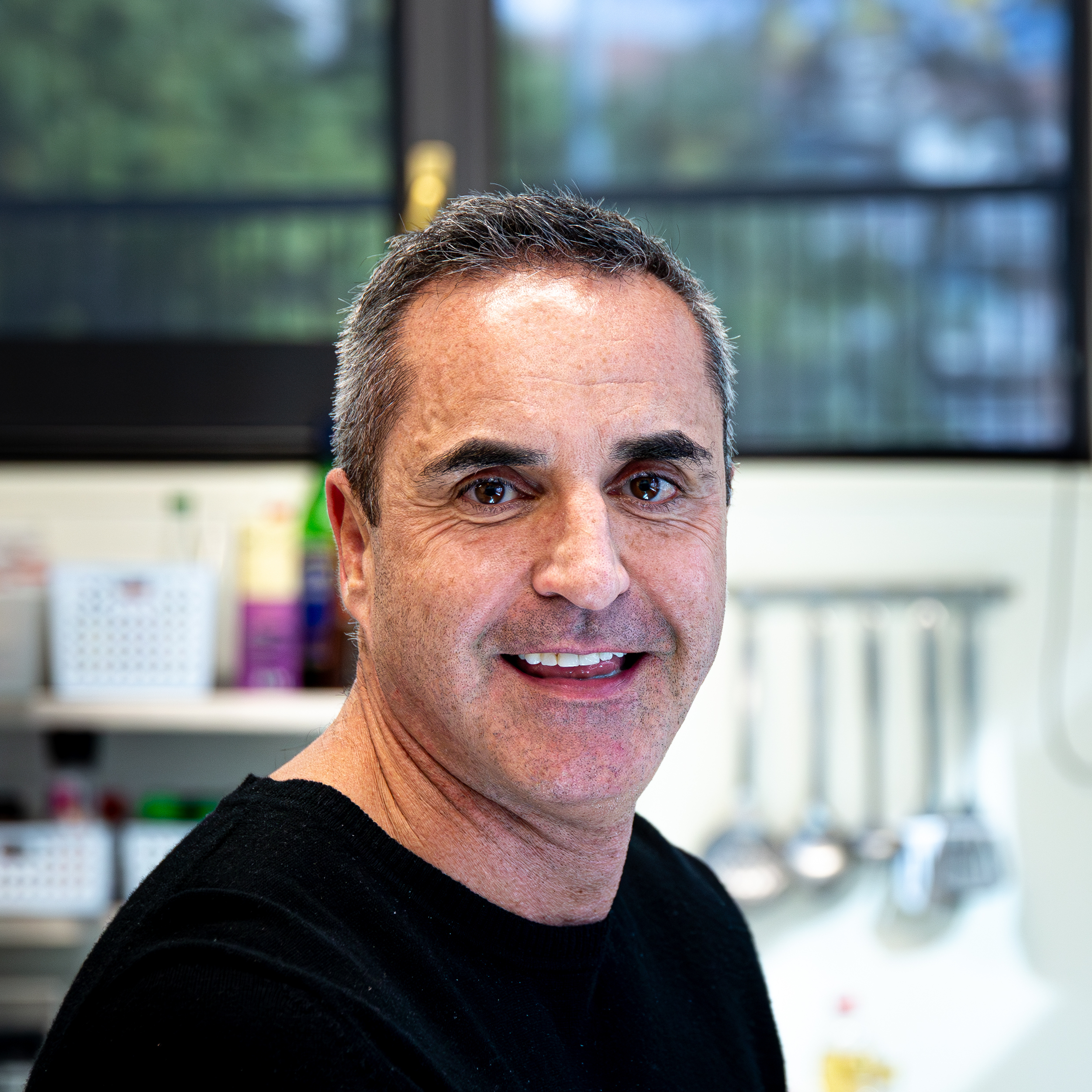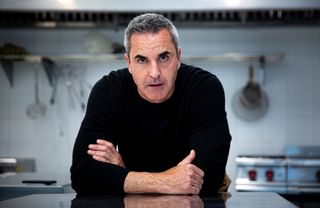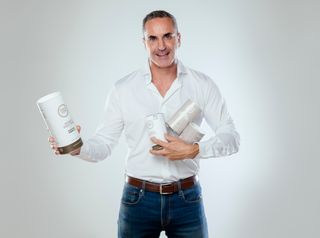
Toni Solà Pérez holds a diploma in Human Nutrition and Dietetics from the University of Vic and a master’s degree in Business Administration and Management from the University of Vic - Universitat Central de Catalunya (UVic-UCC), from the 2010 and 2023 classes, respectively. With a career path that combines nutrition science with entrepreneurship, Solà has developed projects such as Protein Gastronomy and launched product lines like Protein Senior, to create innovative solutions in the food sector. We talk to him to find out what it was like to be an undergraduate student at UVic and to hear about his experience as a nutritionist and entrepreneur
When and why did you decide to study Human Nutrition and Dietetics?
I decided to study Human Nutrition and Dietetics when I couldn't find a degree that interested me and had stopped studying to work. Even though nutrition was a little-known field with few opportunities, I was very attracted to it. When the degree appeared at UVic, despite difficulties, I opted for it, for my passion, for nutrition.
"Even though nutrition was a little-known field with few opportunities, I was very attracted to it"
Why did you start studying late and what was your university experience like at an older age than the other students?
I entered the university through the entrance exams for those over twenty-five. Although I was one of the oldest in the class, this was not a problem for me. In fact, the most complicated thing was the financial aspect: I had to quit my job and live off my savings for a while. The classes were face-to-face and took up a lot of my time, which made it difficult for me to combine them with a job. Despite these difficulties, I really enjoyed the university experience. It was indeed a challenge, but it brought me great personal satisfaction and gave me a different perspective that I value greatly.
"In fact, the most complicated thing was the financial aspect I had to quit my job and live off my savings for a while"
Do you think the profession of nutritionist has the visibility and recognition it deserves?
The profession of nutritionist has progressed greatly in terms of visibility and recognition, but there is still a way to go. Fifteen years ago, the role of dietitian was hardly known in sectors such as professional sports or healthcare. For example, most football teams - except a few clubs like Girona - did not have a dietitian. Now, almost all clubs have one, even beyond the first division. The same is true of health centres and hospitals. At first, dietitians were hired by external companies, but now they are part of the hospital staff. Therefore, this change is noticeable in public health and in the sports field. So society has begun to understand our value and, although we are not quite where we should be, we are on the right track.

What memories do you have of your time at UVic and what do you value most about your experience as a student?
Personally, I really enjoyed the university stage. In the beginning, I was quite critical of the University, but, over time, and after having been to other universities in Spain and abroad, I have valued more what UVic has to offer. For example, the proximity to teachers is unmatched. In other universities, class sizes are usually very big and it is easy to go unnoticed, but here you have the opportunity to interact directly with the teachers, a factor that greatly enriches learning. If you know how to take advantage of it, this relationship is very powerful and priceless.
I think the University’s infrastructure is excellent and hard to match in other institutions. We don't have to go to distant campuses; here, everything is nearby, and this makes it very easy to access all the resources. We have a very well-equipped kitchen, which is essential for our training, and in general UVic is a university that has practically everything we need.
"The nutritionist profession has progressed greatly in terms of visibility and recognition, but there is still a way to go"
What inspired you to found Protein Gastronomy and how did this project come abou
Protein Gastronomy was born from my desire to provide nutritional solutions for needs I observed in the market. I identified gaps in the quality of the products that are available and felt I could create alternatives that would really help people.
During the pandemic, I used the time to develop a factory and design products. I also applied knowledge of industrial processes and focused on creating safe and effective product lines, always with health as the priority.
You recently launched Protein Senior. What led you to focus on the elderly market?
The decision to focus on the elderly market emerged from a need we detected. Initially, we were centred on young and active customers, but we received increasing requests from older people who wanted to stay healthy. This population, which has good purchasing power and knowledge, was interested in our products. So we adapted our offer to older people and created a specific line for the pharmaceutical channel. The results have been very positive: pharmacies have bought it from us, which confirms that our product is in demand. We have also developed an app to manage the needs of customers, especially those with loss of muscle mass. We are committed to offering products that truly meet the needs of seniors.
How did you experience the transition from being a Nutrition student to becoming an entrepreneur?
My transition from student to entrepreneur was gradual. After finishing my degree, I realized that I needed more practical experience, so I did several master’s degrees and a PhD. All this knowledge helped me to work with sportspeople and gain a deeper understanding of the sector. However, the business side is not covered in depth at university. I faced challenges, and learned from mistakes in the real world. There came a time when I realised that I had good knowledge of nutrition and health, so I decided to do a university master's degree in business at UVic to complement my education. My academic experience provided me with a solid foundation, but I needed ongoing training and a dose of hands-on learning to move into entrepreneurship.

How has your company evolved since its inception and what challenges have you overcome along the way?
One of the biggest challenges has been finding the right resources. We worked with a few resources for a long time and I learned to spot opportunities to grow the company. I've also learnt that the relationship with partners is crucial: running a business is just as complicated as maintaining a personal relationship. Partners must share similar values and motivations; if you don't have a good connection, things can get complicated quickly.
Also, I have found that creativity tends to disappear when we are in difficult situations. At times of pressure, it is important to have good emotional support and clear communication with the team to keep creativity alive and be able to solve problems. So the key lies in staying aligned with the company's purpose and knowing that it's a journey that requires dedication.
"Managing a company is as complicated as maintaining a personal relationship"
What is the highlight of your career as a nutritionist and entrepreneur?
The ability to create connections. I have been fortunate to collaborate with football teams, doctors and researchers, which is a challenge because it is difficult to get along with people from such diverse disciplines. This ability allows me to act as a bridge between the dietician, the trainer and the catering companies, an aspect that facilitates the implementation of effective solutions. Also, my ability to think of innovative products and create them is another key aspect. I like to look for options that add value.
If you had to give one piece of advice to undergraduates who want to start up a company and innovate in the future, what would it be?
I would say that it is important to be motivated and curious, but not everyone has to be an entrepreneur. Entrepreneurship is not just about coming up with new ideas; it also consists of making contributions within your own company, providing solutions and making improvements to your daily work. Many young people are so focused on the idea of being entrepreneurs that they forget that they can innovate and add value by working in teams or within established organizations.
It should be remembered that starting a business can be difficult and is full of pressure and moments of loneliness; not everyone is ready for it. You need sound knowledge, patience and the ability to learn from mistakes. Knowledge and constant training are essential to identify problems and find viable solutions. In addition, innovation is not just about doing something new; it's about improving what already exists and making it the norm in the sector. If you want to succeed, you have to be not only creative, but also well prepared and know your area of expertise thoroughly.
Are there any anecdotes from your work that has affected you particularly or that you remember with special affection?
Yes, of course! One story I will never forget is how I met my partner at UVic. She was an intern at the library, and after days and days of going there to study, we ended up together.